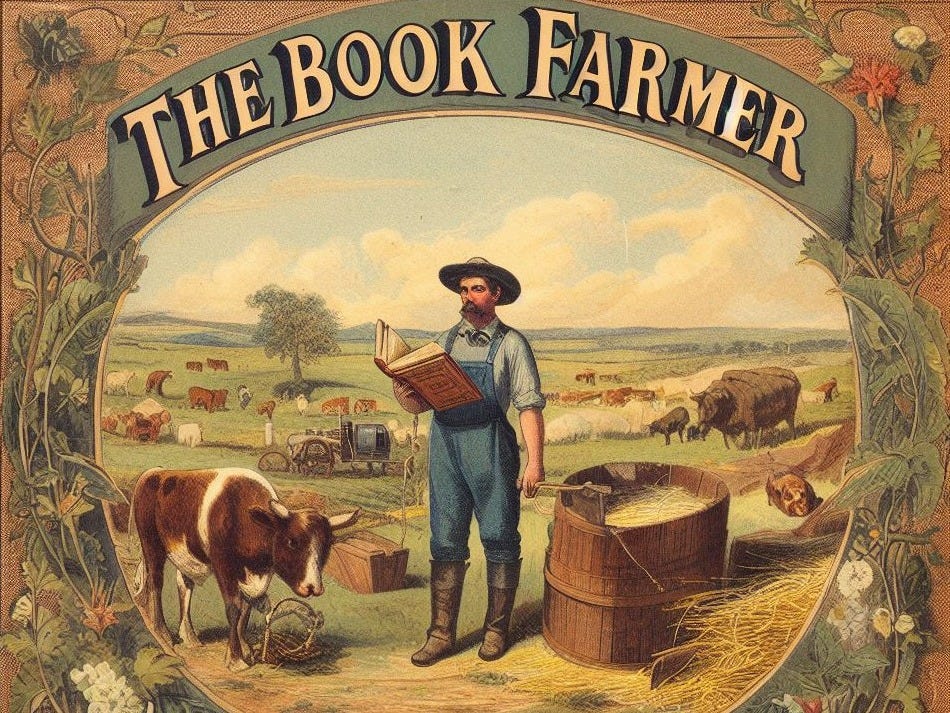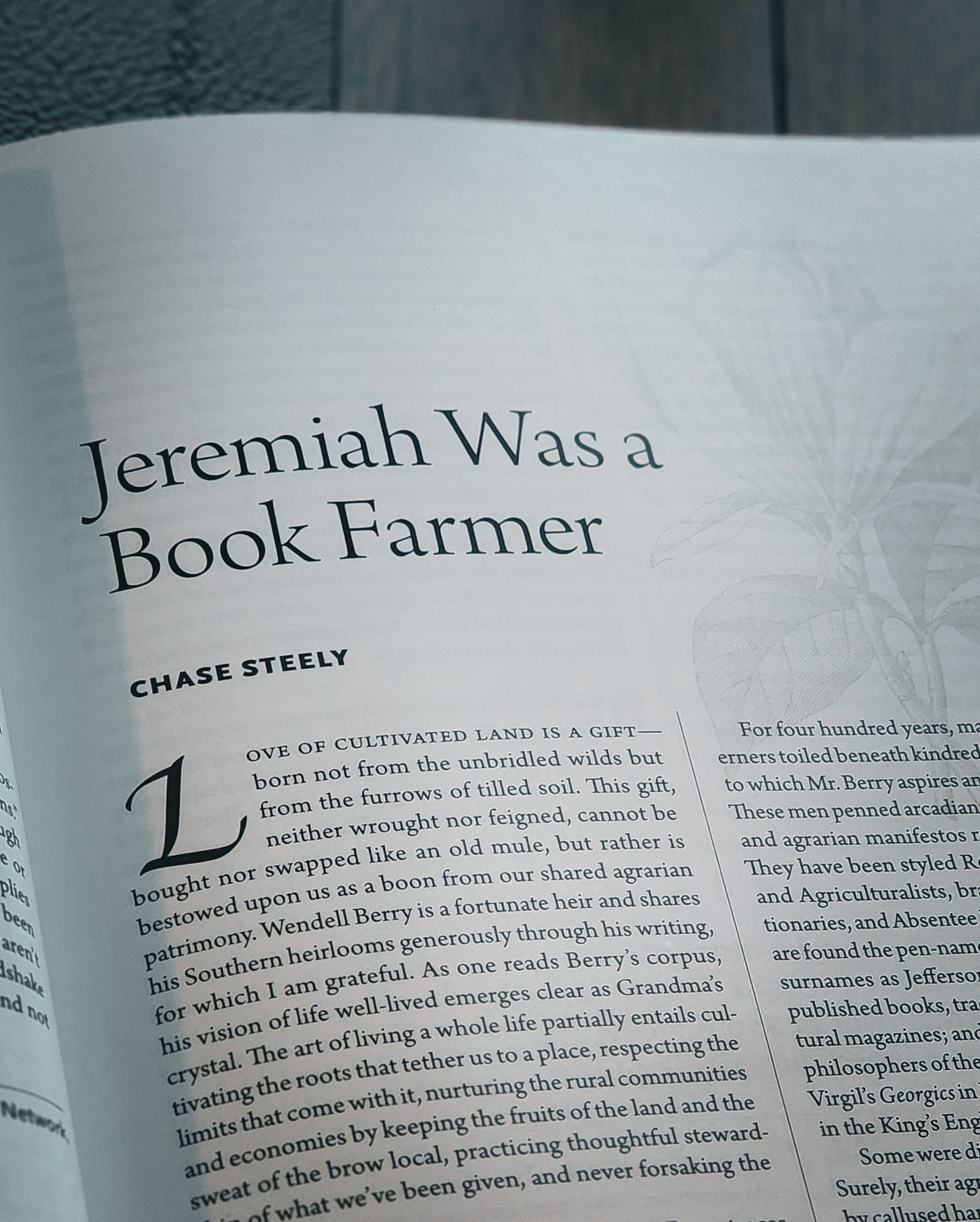Jeremiah Was A Book Farmer
I’m grateful to Moonshine & Magnolias, A Journal for Southern Regional Consciousness for publishing my essay, “Jeremiah Was A Book Farmer” in their second issue (Spring, 2023).
My aim was to tread Wendell Berry’s expansive corpus and glean a handful of his oft-uttered lamentations to illustrate how agrarian-minded Southerners trumpeted similar woes in every generation since Jamestown to a people without ears to hear.
I read thousands of pages and wrote dozens of pages of notes to write a four-page essay. Over to my notes.
Agricultural Societies & Journals
In the wake of a little Colonial secession, the bright-eyed Republic faced agricultural troubles, born from a frontier/abundant perspective that invited carefree cultivation practices. The once-fertile fields lay abandoned and barren like abandoned forts, particularly troublesome given that the livelihood of almost 90% of citizens was rooted in agriculture. A prevailing disdain for 'book learning' was common among the predominant farming populace.
The initial nod and counter came from learned gentlemen farmers, who, discerning the broader ramifications, established agricultural societies in urban settings, notably the Philadelphia Society for the Promotion of Agriculture (George Washington and Benjamin Franklin were members) and the New York Society for the Promotion of Agriculture and Manufacturers.
These societies compiled agricultural libraries that served as havens for 'papers on farming' and streamlined their dissemination through newspapers and books. With all these organizations nestled in urban locales, there weren’t many rural farmers on the membership rolls.
In 1819, the country saw the advent of its first triumphant agricultural journal, the American Farmer. The weekly periodical was founded in Baltimore by Postmaster John Skinner amidst Maryland's decaying agricultural economy, exacerbated by the War of 1812. Skinner aspired to bridge a prominent information void, to “collect information from every source” and distribute crucial “knowledge and skill” to the state’s farmers. The American Farmer was met with skepticism rather than keen embrace, as bewildered readers questioned its purpose and motives.
An Expert, Scientist, and Book Farmer walk into a bar
In the 1820s, Supreme Court Justice Joseph Story saw a new era dawning: an age of reading, Many welcomed this reading generation, as a nearly utopian zeal for reading gripped the nation. Reformists implored citizens to forsake traditional wisdom and heed the counsel of printed experts. Discarding ancestral, orally-transmitted wisdom, the innovative American of the era sought guidance in everything by the book, from agriculture to parenting.
In the early American Republic the concept of book farming, using written guides for agricultural practices, was an ink war that dang near turned bloody. Agricultural publications worked like they just heard a Jonathan Edwards sermon to dispel resistance against this book farming. You can’t just go around lecturing at folks, telling how what their Daddy taught them was backward bat guano. You might catch some lever-action loving. I write about both sides in my M&M piece.
The Cultivator (Albany, NY), published a debate between tradition and evolution through a father, “a hereditary farmer of the old school”, and his son, educated in scientific farming. The elder, steeped in a dignified mastery of corn and swine, just as lineage before him, scoffs at the thought of absorbing new ways from the ink of indolent men who’ve never kissed a corn hill with a hoe. The son respectfully posited that combining hard work with modern knowledge promised richer yields.
Naturally, the Cultivator found alliance with the son, implying discord was fostered more by distractions, be they men’s evenings in the tavern or women’s unneeded social visitations, rather than home sciences. In reformist eyes, unions should conjoin readers in shared bibliophilic devotion, partners diligently dedicating daily hours to collective reading.
The literary efforts of the Southern journals, invariably aligned towards planters, neglected yeomen, or dirt farmers as they were called. The dirt farmers, by tradition, distanced themselves from planters and rejected the notion of book farming.
Asides
Here are a few things to ponder. Who is Berry’s audience? If you know any farmers, have they ever heard of Berry or the Southern Agrarians? Do they read at all? If so, what do they read? With that settled, I ask again, for whom is Berry writing?
I also went through hundreds of mentions of book farming/farmers on the Internet Archive. Take a look for yourself -> link
Sources
A History of the Book in America: Volume 2: an Extensive Republic: Print, Culture, and Society in the New Nation, 1790-1840, edited by Robert A. Gross
Jamene Brenton Stewart - Informing the South: On the Culture of Print in Antebellum Augusta, Georgia 1828-1860
Agricultural Literature, Proud Heritage, Future Promise, a Bicentennial Symposium, September 24-26, 1975
I’ll post a big ole bibliography on the subject eventually.





